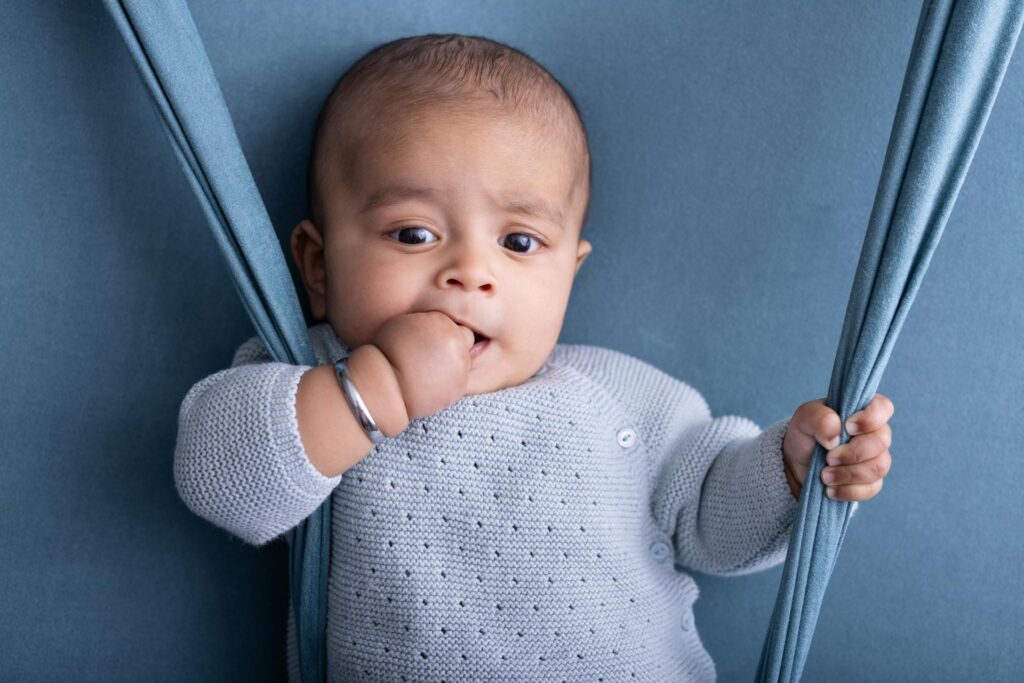After a short period, you will find your toddlers and babies sucking on their thumbs. This could be a problem when it comes to hygiene as babies and toddlers touch a lot of toys, places, and surfaces, and it anyways is wiser if their hands are clean or washed for their good. And if your toddlers and babies do stay safe from all the unhygienic behaviors, you may also not have to make many visits to a Pediatricians. Let’s understand further how you can keep your baby safe and continue to have fun.
Understanding the Habit
Thumb sucking is one of the most universal baby behaviors. This reflex is important because it’s how babies get all their nutrition in the first few months of life. When something comes into contact with the roof of their mouth (usually a human nipple or bottle pacifies), they automatically start sucking. It has been diagnosed that thumb sucking stimulates a nerve that releases psychological and physical tension, and this is also done mostly when they are sleepy or when they suck on their thumbs; they fall asleep soon.
Dentist’s Advice
In most cases, it is seen that ideally, kids would stop on their own by their first birthday; most kids stop thumb-sucking on their own by age 4. If you think that you should not wait that long, humiliating the child into stopping it will not be beneficial. For further assistance, it is always a good idea to check with your dentist for specific guidance related to your worries because sucking onto their thumbs may ruin their gums/teeth over time which is why it is important to make frequent visits to their dentist even if your child does not enjoy seeing the dentist so much. Based on what your dentist has to recommend you may be able to help your child. For example, if you introduce your child to a soft pacifier, it will not damage the child’s gums over some time, nor will your child grow an attachment to it.
Distractions
Occupying your child in various activities to keep their hands occupied would distract them from thinking of their thumbs. These activities could include coloring or arts and crafts, dancing, writing, baking, biking, jewelry-making, and any sports as well, which on the other hand, will also help your child improve their skills academically and mentally. However, it’s not practical to keep your baby/child distracted 24/7, so this method could be taken as a complement to the other methods explained. Masking may also help block the path of their thumb towards the direction of their mouth as they face blockage each time. This, so far, has been proven to be one of the most successful methods to help parents fix their child’s gum-affecting habit. Do make sure that these masks have proper holes to help your baby/child breathe easily without having the convenience of sucking their thumb. It’s still advised to speak to your doctor about this method.
Sweet Treats
You can also try to reward your child by explaining to them that if they don’t suck their thumb, they may get something in return that would cheer them up better or provide them with gifts, their favorite food or candies at one point, children being smart and able to understand- they will catch on the fact that they shouldn’t be sucking on their thumbs for better rewards. You’ll be surprised by how much a child can catch a pattern.

The Shock Polish
One of the popular products in the market would be a special nail polish for people who bite their nails out of anxiety. This same product or similar product for babies can be used to help them stop sucking onto their thumbs because as soon as they taste the bitterness or dissatisfactory taste, they will learn the important lesson- no finger in mouth! Experiment with different brands to find one that your child finds less tolerable. Please be mindful of not ridiculing, teasing, or punishing your child/baby for thumb-sucking because it can affect your child’s well-being and self-esteem. A more upbeat approach is a better way to support your child in the short and the long term.
Sock It!
As we have learned, sucking the thumb could help them calm down and sleep sooner but how long will this habit last is the question. Parents cannot let their children continue this habit even after they are 2 years old because some habits take the longest time to let go of, so what you can do is take advantage of them when they are asleep. For example, once they are asleep or when your baby goes to sleep, you can try to innovate and put socks on their arms so they do not have anything to depend on for their sleep. You can also give it a try, once they are awake and active, or you might as well use a band-aid on their thumbs.
Be mindful of their emotions
You must try your hardest to avoid putting your child in situations that are upsetting while he or she is trying to break the thumb-sucking habit. Your child will likely turn to thumb-sucking for comfort. Make sure your child gets enough sleep and food during this time and remind yourself to spend time with them, make them laugh, or play peek-a-boo even for a while so they find other interests- especially for babies.
The older, the wiser
Most kids usually give up sucking their thumbs during elementary school, but isn’t that too late? Shouldn’t that be concerning to you as a parent? Your child may be forced to stop doing so due to peer pressure however and that could, in most cases, help them quit this habit as it works as an encouragement as they grow older but even that could take some time because after the return home or when they alone, intentionally or unintentionally they might suck on their thumbs until they can fully give it up.
Plushies to the rescue!
You might also give your child a pillow or stuffed animal to squeeze and see if their anxiety or calmness transfers to that part of their daily routine. Some parents hand their children candy or fruits to suck on for a while by moving their thumbs away, occupying them with delicious or nutritious treats! Some dentists often advise the parents to intervene to prevent potential damage, and some pediatrics would recommend letting the child learn on their own. Ultimately, the decision to actively discourage thumb-sucking is a personal one that should be made by each family, considering their own needs and their children’s unique personalities.
Conclusion
Nothing is difficult if you take further help from parents, who are going through the same issue or successful parents who have already undergone this stage of freeing their baby/child of this habit. Surely these parents and friends, and most importantly your child’s doctor will always be able to help you further based on your situation to help you find what is most suitable according to your child’s habits and behavior, what they like, and what upsets them or makes them happy.


